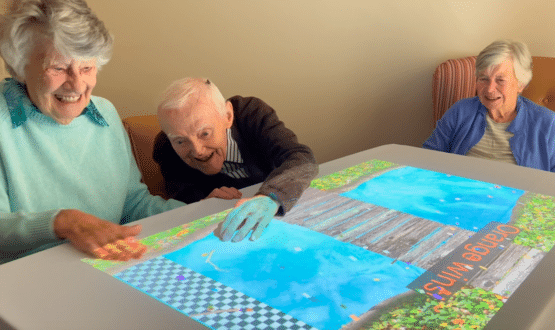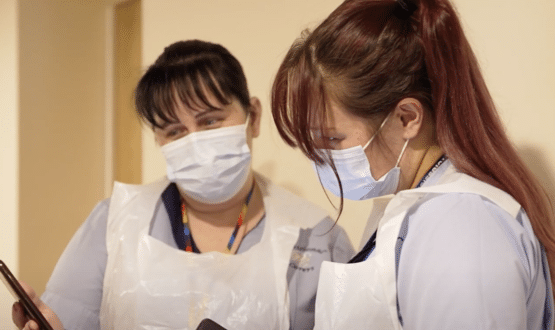Light tech project launched across 10 care homes for dementia patients
- 17 May 2024

An initiative that uses interactive light technology to develop activities and games for people with dementia has been rolled out by the Alzheimer’s Society in partnership with Sport England and Social-Ability.
The Happiness Programme, developed by Social-Ability, launched in 10 care homes nationwide, including London, Sheffield, Derby, Manchester and Newcastle on 13 May 2024, with the aim of bringing “laughter and happiness” to residents.
Participants in the programme are invited to test out activities which make use of light technology, enabling users to engage in physically and mentally engaging games like popping bubbles, playing the piano, colouring pictures, sweeping leaves as well as other activities like karaoke, bingo and quizzes.
The activities are delivered using a portable projector which can used can be used on surfaces such as floors, ceilings, walls, whiteboards or beds.
Activities can also feature props to further increase range of motion with games like balloon popping or beach ball.
John Ramsay, managing director and co-founder of Social-Ability, said that he founded the organisation “to bring laughter and happiness to everyone facing dementia as well as for palliative care, rehabilitation, and those with learning disabilities”.
“Working collaboratively is extremely important to us to grow the impact of Social-Ability, and we are honoured to be working alongside such a creative and experienced innovation team.
“We’re so excited to see the results of the project – in 2024, nobody living with dementia should be without laughter or activity,” Ramsay said.
The project, which is funded by Sport England, will start with a three-month phase focusing on current Happiness Programme games, followed by a further three-month phase testing newly-developed activities to test how games can encourage movement and physical activity.
Simon Lord, head of innovation at Alzheimer’s Society, said: “Keeping active is hugely important for people with dementia and has a range of benefits such as improved quality of life.
“This partnership underscores our commitment to evidence-based practices, and we look forward to seeing the results of the new meaningful activities and the potential improved outcomes for people living with dementia”.
The Happiness Programme has been rolled out by more than 1,250 of Social-Ability’s partners in the UK, Ireland and Canada.
A poll funded by Alzheimer’s UK and Innovate UK last year, found that more than two-thirds of GPs in the UK would like the ability to prescribe assistive technologies to their patients when they are diagnosed with dementia.




